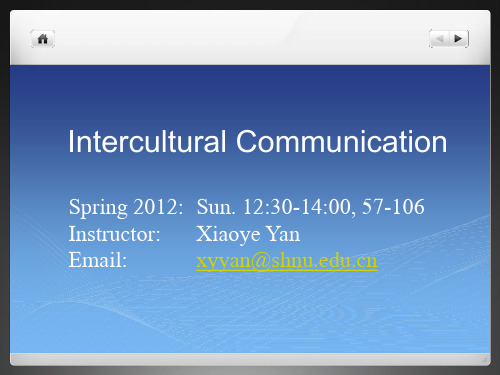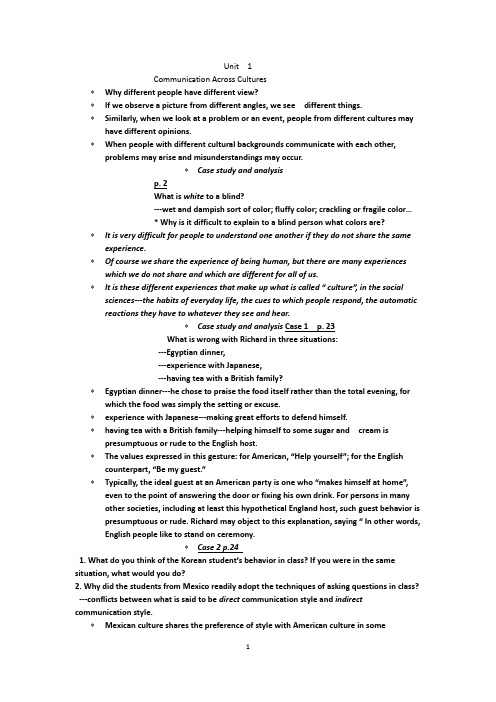跨文化交际课件Unit_1
合集下载
Unit 1 Intercultural Communication PPT课件

• Presence: Presence in class is a must. Role-calling will be done
from time to time. 1/3 of absence means
automatically failure
in this course.
• Practice: Practice communicating with English-speaking people whenever the chance comes and write down your experience of
Intercultural Communication: Theory and
Practice
跨文化交际教程
北京大学出版社
Intercultural Communication: Requirements of this course
• Previewing: Preview the text before coming to class.
1. Cross-Cultural Awareness
• What is cross-cultural awareness? • Cross-cultural awareness is the ability to
understand cultures—your own and others’—by means of objective, non-judgmental comparisons. It is an appreciation for, an understanding of, cultural pluralism—the ability to get rid of our ethnocentric tendencies and to accept another culture on its own terms. Many cross-cultural interactions go sour due to a lack of such an awareness.
文化与跨文化交际——大学英语视听说 教学课件Unit 1

A. hoop B. a kind of drink C. a wagon tire D. a kind of chocolate
Watch the video again, and figure out the answer to each of the following questions.
assign corridor headmistress
bleep
1. to give or allocate 2. long passage in a building or train,
especially with rooms on either side 3. a female headteacher 4. a short, high sound made by a
What does “Beverly Hills, 90210” imply in the context?
A. a phone number B. a mail address C. a life style D. a hot spot
Speaking and Critical Thinking
machine, especially if it is repeated
Useful words and expressions
medieval 5. related to the Middle Ages (= the
period in uropean history from about
AD 600 to AD 1500)
Listening and Speaking Tips
How do you read each of the following sentences? What do you expect them to sound like when others read or say them?
Watch the video again, and figure out the answer to each of the following questions.
assign corridor headmistress
bleep
1. to give or allocate 2. long passage in a building or train,
especially with rooms on either side 3. a female headteacher 4. a short, high sound made by a
What does “Beverly Hills, 90210” imply in the context?
A. a phone number B. a mail address C. a life style D. a hot spot
Speaking and Critical Thinking
machine, especially if it is repeated
Useful words and expressions
medieval 5. related to the Middle Ages (= the
period in uropean history from about
AD 600 to AD 1500)
Listening and Speaking Tips
How do you read each of the following sentences? What do you expect them to sound like when others read or say them?
跨文化交际Unit 1课件

Verbal Communication
- Names of objects
- Cultural connotations of words
- The way people use languages
Intercultural Communication : An Introduction 3
Nonverbal Communication - gestures and postures
The Challenge of Globalization
Attitudes towards globalization: - both a fact and an opportunity; - the development of a global mind-set
Cultural diversity must be recognized and appreciated
The
A brief history of the study of ICC
1946: Foreign Service Institute was established in the US 1959: The Silent Language by Edward T. Hall, an American anthropologist, was published, marking the emergence of ICC 1966: ICC was regarded as curriculum in the US 1970: ICC was recognized as an independent area of study by the International Communication Association
Cross-cultural Communication 跨文化交际 PPT课件 (2)

5.Case studies
Mutual Monitoring Process
Xiu went to a BC buffet reception in the BC headquarters in Beijing. It just so happened that Xiu arrived a little too early. The waiting lounge was almost empty except a charming lady sitting at a corner seat. After a long interval of unbearable silence Xiu decided to break the silence by approaching the lady.
Yes, but not good
1.An orator delivers a speech to a large gathering. 3. You send an e-mail message to an American friend. 4.Jane lies in bed reading a novel.
Model Two: unilateral-cultural model
(one knows another’s language and cultural environment but the other one doesn’t)
Lu Bing ,a Chinese tour guide is talking in English with George Luke, a British tourist who does not know Chinese at all.
Activity 3: Meanings in communication
Cross-Cultural Communication Unit 1-4 跨文化交际(课堂PPT)

15
CHAPTER 1 - Communication and Culture: The Challenge of The Future
Dominant Culture
Co-Cultures
• It's the one in power -
• They are numerous.
control.
• Distinct and unique
• Meanwhile, aging population in more developed countries – Could bring more communication issues between older generations and younger generations (this can be treated as co-culture).
ethnic background, age, sex,
media, monetary systems,
or other factors.
etc.
16
17
• We learn our culture through proverbs
– Offer an important set of instructions
Our goal in this class is to answer some of the following questions: • Why do we often uncomfortable when encountering people who are different from yourself? • Why do people from different cultures behave in ways that seem strange to you? • How do cultural differences influence communication? • Which cultural differences are important and which are inconsequential? • Why is it difficult to understand and appreciate cultural difference?
Unit 1 跨文化交际

Unit 1 Communication Across Cultures Why different people have different view? If we observe a picture from different angles, we see different things. Similarly, when we look at a problem or an event, people from different cultures may have different opinions. When people with different cultural backgrounds communicate with each other, problems may arise and misunderstandings may occur. Case study and analysis p. 2 What is white to a blind? ---wet and dampish sort of color; fluffy color; crackling or fragile color… * Why is it difficult to explain to a blind person what colors are? It is very difficult for people to understand one another if they do not share the same experience. Of course we share the experience of being human, but there are many experiences which we do not share and which are different for all of us. It is these different experiences that make up what is called “ culture”, in the social sciences---the habits of everyday life, the cues to which people respond, the automatic reactions they have to whatever they see and hear. Case study and analysis Case 1 p. 23 What is wrong with Richard in three situations: ---Egyptian dinner, ---experience with Japanese, ---having tea with a British family? Egyptian dinner---he chose to praise the food itself rather than the total evening, for which the food was simply the setting or excuse. experience with Japanese---making great efforts to defend himself. having tea with a British family---helping himself to some sugar and cream is presumptuous or rude to the English host.d to say what is on their minds and mean what they say, students in class are expected to ask questions when they need clarification. Korean generally prefer indirect communication style---tend not to say what is on their minds and to reply more on implications and inference. To many Koreans, numerous questions would show a disrespect for the teacher, and would also reflect that the student has not studied hard enough. Identifying difference: p. 18 Addressing Chinese addressing system in comparison with American one 1) To address family members and acquaintances Chinese: --- using the term of relationship to address family members, relatives or close neighbors, e.g. 二哥,三姐,四婶,周大伯,李大妈, 张叔叔,李阿姨等; ---using “lao” or “xiao” plus surname to address 40-year-old people or young or youngish people, e.g. 老王,小刘 etc. American: ---using the first name/given name e.g. Tom, Linda, Michael etc. to people of all ages, of different social status, even one’s parents or grandparents. The main exceptions are addressing one’s parents (Dad, Mom, Mum or Mother), one’s grandparents (Grandpa, Grandma) and sometimes an older relative (Aunt Mary or Uncle Tim); mother-in-law (mom, Mrs. XX or her personal name) In English when one’s youth is emphasized, then the third person “young Thomas” is used. To call someone “old Thomas” can imply a whole range of things, from familiarity to contempt to respect for shrewdness and experience, but “old” here is never the equivalent of the Chinese “lao”. It should be mentioned that if American ever do go over to “Auntie Zhao” or “Grandpa Wang” with non-relatives, it usually reflects either their ethnic background or long and deep friendship. In English Brother Joseph or Sister Mary would commonly be understood as referring to persons belonging to a Catholic group or some religious or professional society. In Indonesia, you call a person “Pak” to show respect. While in Singapore, you simply call an elder person whom you do not know “Uncle”. 2)To address people with certain titles or occupations Chinese: Using a person’s surname plus the person’s title, organization, or occupation, such as 黄局长, 林经理, 李校长,陈老师 etc. How to address a teacher has long been a problem. Now it’s becoming common to call the teacher Mr. Chen, Mrs. Yang, Miss Chen which follows the English custom. In the U.S. primary schools children will sometimes address an instructor as “teacher” (more often “Ms. or Ms. plus the surname), in universities, “Professor” or “Professor or Dr. (who has a PhD) plus surname” . But there’s a tendency of younger staffers in some Chinese units that are not schools to call older employees “laoshi” (teacher). In the U.S., young employees are free to call
跨文化交际课程unit1

The attitudes by foreigners towards Chinese People
Obey but not Follow
Being doubtful
ShanZhai everywhere
The attitudes by Chinese towards Westerners
Mind your own business
Class participation and assignments-60% Final examnation-40% Course Objectives: To learn more about the different cultures To form the awareness of intercultural communication To increase cross-cultural skills on the job
Level one: Cultural differences are exotic Level two: Cultural differences are frustrating level three: The different culture is believable level four: The different culture is believable
2.(A) The total accumulation of beliefs, customs, values, behaviors, institutions and communication patterns that are shared, learned and passed down through the generations in an identifiable group of people.
跨文化交际实用教程Unit1精品PPT课件

4) Culture is the deposit of knowledge, experience, beliefs, values, actions, attitudes, meanings, hierarchies, religion, notions of time, roles, spatial relations, concepts of the universe, and artifacts acquired by a group of people in the course of generations through individual and group striving(努力,奋斗 ).
very tired. You’re old… Catherine (an elderly American lady):
Oh, I’m NOT old, and I’m NOT tired.
5
In the West: A: How are you doing now? Would you
like to rest? B: No, not a bit.
批注本地保存成功开通会员云端永久保存去开通
Intercultural Communication
A Practical Coursebook
跨文化交际实用教程
1
Unit 1 An Introduction
2
Objectives
Learn the purpose of learning the course.
20
3) Culture is an Integrated system of learned behavior patterns which are characteristic of the members of a society and which are not the result of biological inheritance.
very tired. You’re old… Catherine (an elderly American lady):
Oh, I’m NOT old, and I’m NOT tired.
5
In the West: A: How are you doing now? Would you
like to rest? B: No, not a bit.
批注本地保存成功开通会员云端永久保存去开通
Intercultural Communication
A Practical Coursebook
跨文化交际实用教程
1
Unit 1 An Introduction
2
Objectives
Learn the purpose of learning the course.
20
3) Culture is an Integrated system of learned behavior patterns which are characteristic of the members of a society and which are not the result of biological inheritance.
Cross-CulturalCommunicationUnit1-4跨文化交际.ppt

CHAPTER 1 - Communication and Culture: The Challenge of The Future
Dominant Culture
Co-Cultures
• It's the one in power -
• They are numerous.
control.
• Distinct and unique
• We learned our culture through mass media
• Culture is transmitted from generation to generation
• Culture is based on symbols
• Culture is subjected to change
• Subjective elements include: values, beliefs, attitudes, orientations, and underlying assumptions prevalent among people in the society.
• Basic functions of Culture: adapt to a particular ecology, and includes the knowledge that people need to have in order to function in their own social environment.
• Culture is integrated
• Culture is adaptive
CHAPTER 1 - Communication and Culture: The Challenge of The Future
Unit+1 跨文化交际

Unit 1
An Introduction
CONTENTS
1. Case study 2. Terminology (术语) 3. Barriers to effective intercultural communication 4. Strategies for effective intercultural communication
Examine the following cases and summarize the characteristics of culture:
1. Your parents kiss you and you learn about kissing—whom to kiss, when to kiss, and so on. 2. Your children laugh at the same jokes you laugh at ,which you heard from your parents in your own childhood. 3. You read Chinese books or talk with an American in English.
Tip (external culture): language, customs, typical food, dress acquired through observation, education/training easily learned and can be changed. Under water (internal culture): values, ways of thinking and perceiving, nonverbal communication Overtly(公开地)learned (formal education) or implicitly learned through socialisation influences/motivates our behaviour
An Introduction
CONTENTS
1. Case study 2. Terminology (术语) 3. Barriers to effective intercultural communication 4. Strategies for effective intercultural communication
Examine the following cases and summarize the characteristics of culture:
1. Your parents kiss you and you learn about kissing—whom to kiss, when to kiss, and so on. 2. Your children laugh at the same jokes you laugh at ,which you heard from your parents in your own childhood. 3. You read Chinese books or talk with an American in English.
Tip (external culture): language, customs, typical food, dress acquired through observation, education/training easily learned and can be changed. Under water (internal culture): values, ways of thinking and perceiving, nonverbal communication Overtly(公开地)learned (formal education) or implicitly learned through socialisation influences/motivates our behaviour
跨文化交际-Unit_1

3.What are the goals of this textbook?
Word Combinations pushy
trying constantly to draw attention to oneself and gain an advantage; self-assertive 爱讨便宜的;坚持己见的;一意孤行的 e.g. He made himself unpopular by being so pushy. 他特别喜欢一意孤行,所以人缘不好。
Word Combinations
lie in ① (of abstract things) exist or be found
(指抽象事物)存在,在于 e.g. I only wish it lay within my power to help you. 我但愿能够帮助你。 e.g. The cure for stress lies in learning to relax. 消除紧张的办法在于学会放松。 e.g. It’s obvious where our interest lies. 我们的利益所在是明摆着的事情。 ② (Bri.) = (US) sleep in stay in bed after the normal time for getting up 睡懒觉 e.g. It’s a holiday tomorrow, so you can lie in. 明天是假日,你可以睡懒觉了。
Effective I.C.
• One aspect of effective I.C. is ensuring that messages are communicated accurately. As Gundykunst (1998) writes : “To communicate effectively, we must transmit our messages in a way that strangers [people of other cultural backgrounds] can understand what we mean, and we need to interpret strangers’ message in the way they meant them to be interpreted.” • However, as Lustig and Koester (1996) point out, effective I.C. requires more than simply getting one’s message across; it also requires communicating in ways that are considered appropriate by the involved parties and don’t result in unnecessary offense.
Word Combinations pushy
trying constantly to draw attention to oneself and gain an advantage; self-assertive 爱讨便宜的;坚持己见的;一意孤行的 e.g. He made himself unpopular by being so pushy. 他特别喜欢一意孤行,所以人缘不好。
Word Combinations
lie in ① (of abstract things) exist or be found
(指抽象事物)存在,在于 e.g. I only wish it lay within my power to help you. 我但愿能够帮助你。 e.g. The cure for stress lies in learning to relax. 消除紧张的办法在于学会放松。 e.g. It’s obvious where our interest lies. 我们的利益所在是明摆着的事情。 ② (Bri.) = (US) sleep in stay in bed after the normal time for getting up 睡懒觉 e.g. It’s a holiday tomorrow, so you can lie in. 明天是假日,你可以睡懒觉了。
Effective I.C.
• One aspect of effective I.C. is ensuring that messages are communicated accurately. As Gundykunst (1998) writes : “To communicate effectively, we must transmit our messages in a way that strangers [people of other cultural backgrounds] can understand what we mean, and we need to interpret strangers’ message in the way they meant them to be interpreted.” • However, as Lustig and Koester (1996) point out, effective I.C. requires more than simply getting one’s message across; it also requires communicating in ways that are considered appropriate by the involved parties and don’t result in unnecessary offense.
- 1、下载文档前请自行甄别文档内容的完整性,平台不提供额外的编辑、内容补充、找答案等附加服务。
- 2、"仅部分预览"的文档,不可在线预览部分如存在完整性等问题,可反馈申请退款(可完整预览的文档不适用该条件!)。
- 3、如文档侵犯您的权益,请联系客服反馈,我们会尽快为您处理(人工客服工作时间:9:00-18:30)。
Whatever the reason behind the rule, you do not insist on offering alcohol. And while I certainly did not figure Heping for Mormon, a Muslim or a reformed alcoholic, so unconscious and so strong are our communicative competence rules that we equally politely never made a second offer of beer to Heping, who probably thought North Americans are most uncouth.
Xiao Li (an interpreter): You must be very tired. You’re old… Catherine (an elderly American lady): Oh, I’m NOT old, and I’m NOT tired.
The Chinese way of showing concern is usually expressed by statement.
American: That’s how we make people feel
comfortable. People feel friendlier toward each other when they use first names. Englishman: it’s different here. For example, when you met my boss you should have used his last name. Also there’s something else that you do that English people don’t often do. American: What’s that? Englishman: You touch people on the shoulder quite a bit, especially when you compliment them. American: I guess I’ve never thought about that before. I suppose that is what I do at home.
Questions for discussion?
In your daily life, do you often accept first offer? If yes, in what situation?
Case 3 Same Language, Different Behavior
(An American traveled to England and was staying with a friend. During his stay, the American decided to talk to the Englishman about some things that were bothering him.) American: I feel uncomfortable with many of the people here, but I’m not sure why. I speak the same language, so there shouldn’t be any problem. Back home, I usually get along with people. You know that I’m very friendly.
2. Different attitudes towards the same object When one coin was lost…
American man: Called a policeman, gave him his telephone number, left with a chewing gum in his mouth. Englishman: Not surprised, shrugged his shoulders, going away, without being troubled by nothing.
Indeed, it is not. Chinese customs show that Heping was being modest, polite, and wellbehaved and every intention of accepting the beer at the second or third offer, impressing charges with modesty. But Heping did not understand North American rules, which firmly say that you do not push alcoholic beverages on anyone. A person may not drink for religious reasons; he may be a reformed alcoholic, or he may be a allergic.
Comment:
this is an important lesson for the American that though they speak the same language problems may still exist when communicating with English people. He doesn’t stop to think that he may have to do thing differently. Luckily, he has someone who can help him understand and quickly learns that in England he needs to be able to do more than just speak English.
Englishman: Yes, that’s true, but
you’re friendly in the way that Americans are friendly. American: I’m not sure I understand. Englishman: Well, for example, at the meeting the other night, you immediately called people by their first names. We do that here, but not when we first meet someone.
Xiao Li (an interpreter): You must be very tired. You’re old… Catherine (an elderly American lady): Oh, I’m NOT old, and I’m NOT tired.
2012-2-16 5
Comment
that he thought the elderly lady would collapse any minute if she doesn’t rest immediately.
2012-2-16 6
Comment
In the West, there is a value placed in
2012-2-16 18
German man: Made a mark within 100 miters on the ground, looking for the lost coin with a magnifying glass.
Japanese man: felt sorry for his own carelessness, still blamed him at home, swearing not to make such a silly mistake again.
2012-2-16 9
Case 2 First Offer
A Canadian colleague and I traveled to Guilin with our admirable guide Heping Liu in very hot weather. Sightseeing is a thirsty business. We did not trust the water and enjoy excellent beer. We politely offered some to Heping but he refused. We said nothing and drank our beer, while poor Heping watched. Only when I saw that Heping in fact liked beer, did it occur to me to ask him whether maybe in Chinese culture it was not polite to accept on the first offer.
Discussion
I. Why take Intercultural Communication?
2012-2-16
4
1. Warm-up Case
Please discuss the case in groups and
make a comment on it.
A Case: Showing Concern In China:
What the inteurteous in China. It means, “If you are tired, we can take a little rest, since you are getting on in years.”
